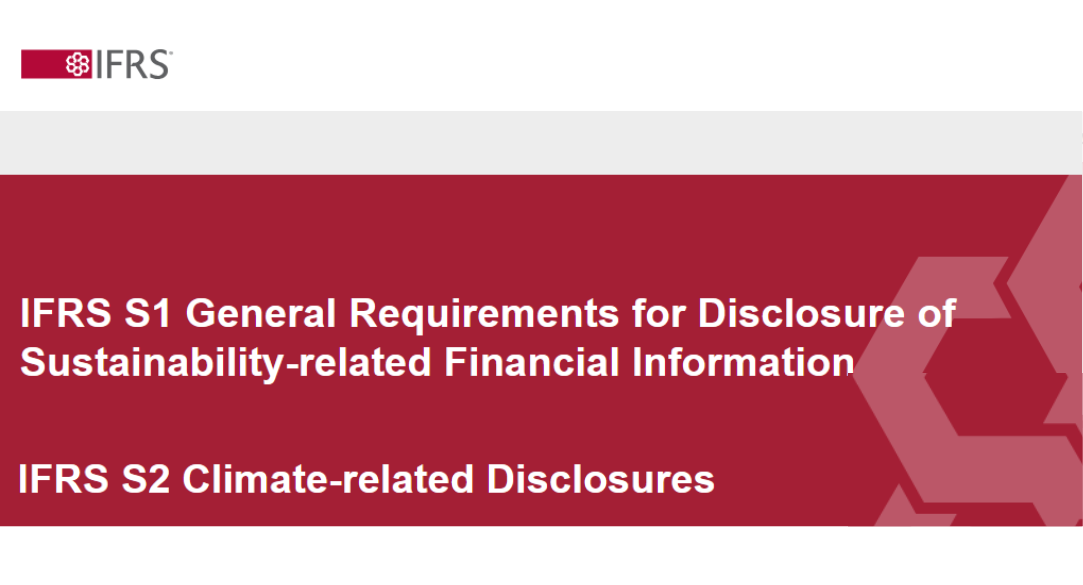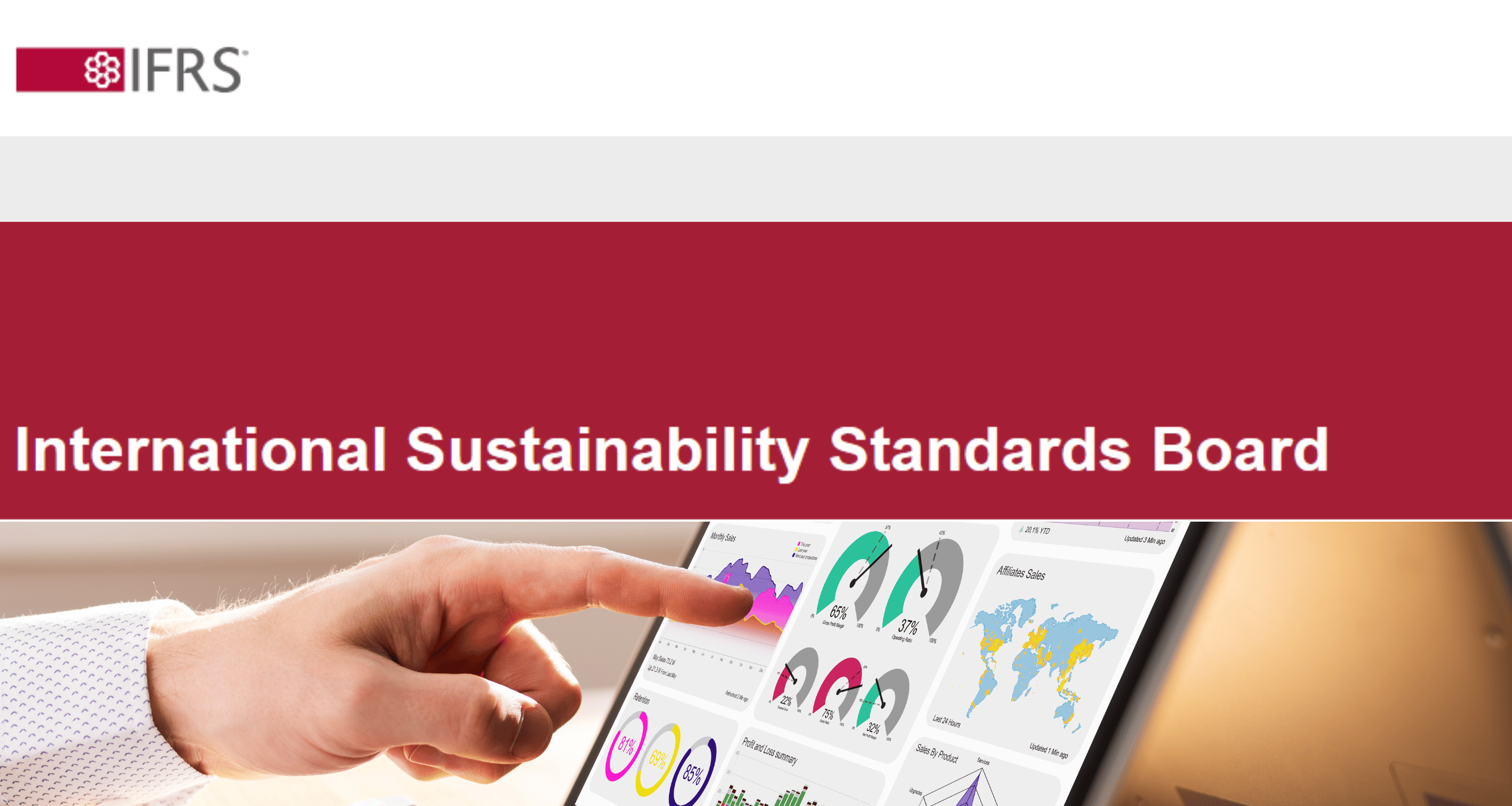The International Sustainability Standards Board (ISSB) is the new player whose mission is to create a globally recognised standard for sustainability reporting that cuts through the complexity and delivers precisely what investors need to make informed decisions.
Sustainability reporting has become more than a mere corporate trend; it's now an essential part of the financial landscape. Investors, from SMEs to large corporations, are no longer content with traditional financial statements alone. They seek a clear, comparable, and reliable picture of a company's sustainability practices and risks. The ISSB has emerged to offer a path toward achieving this transparency.
ISSB's Vision and Standards
Genesis of the ISSB:
The International Sustainability Standards Board (ISSB) emerged in November 2021 at the UN Climate Change Conference (COP26) as a response to the growing global demand for consistency and clarity in sustainability reporting. This demand was echoed by investors and stakeholders alike, and the ISSB was conceived to bridge the gap in the fragmented reporting landscape.
Objectives of ISSB:
The ISSB, founded by the International Financial Reporting Standards (IFRS) Foundation, aims to establish a unified global baseline for sustainability-related financial disclosures. Its objectives are straightforward: to develop high-quality, understandable, enforceable, and globally accepted sustainability disclosure standards. These standards are designed to meet the needs of asset owners, asset managers, and, most importantly, investors.
IFRS S1 and IFRS S2
IFRS S1: General Requirements for Disclosure of Sustainability-related Financial Information
IFRS S1 serves as the foundational framework for sustainability-related financial disclosures. Its primary objective is to establish clear and comprehensive guidelines that companies must follow when disclosing sustainability-related information in their financial reports. Here's a more detailed breakdown of IFRS S1:
- Scope and Coverage: IFRS S1 applies to all entities that prepare general-purpose financial statements and seek to disclose sustainability-related information. It encompasses a broad range of sustainability topics that may impact a company's financial performance and decision-making processes.
- Sustainability-related Information: The standard mandates the disclosure of sustainability-related information over various timeframes, including short, medium, and long-term perspectives. This encompasses data related to sustainability risks, opportunities, and their potential effects on the company's financial prospects.
- Relevance to Financial Statements: IFRS S1 emphasises the integration of sustainability-related information into general-purpose financial reports. This means that sustainability disclosures should be seamlessly incorporated alongside traditional financial data, providing stakeholders with a holistic view of the company's financial and sustainability performance.
- Materiality: The standard places a strong emphasis on materiality, requiring companies to disclose information that is relevant and significant to the understanding of sustainability-related risks and opportunities. Materiality assessments are vital in determining what information to disclose.
- Consistency and Comparability: IFRS S1 promotes the use of consistent reporting frameworks, such as the Sustainability Accounting Standards Board (SASB) standards and the Task Force on Climate-related Financial Disclosures (TCFD) recommendations. This ensures that companies use standardised metrics and terminology, facilitating comparability among peers and industries.
- Industry-Specific Considerations: While IFRS S1 provides a general framework, it acknowledges that sustainability issues can vary across industries. Companies are encouraged to refer to sector-specific standards, such as SASB, to address industry-specific challenges and opportunities.
IFRS S2: Climate-related Disclosures
IFRS S2 focuses specifically on climate-related disclosures. It complements IFRS S1 by providing detailed guidance on reporting climate-related information. Here's a deeper dive into IFRS S2:
- Climate-related Risks and Opportunities: IFRS S2 outlines the disclosure requirements related to climate-related risks and opportunities. It aligns with the four thematic pillars of the Task Force on Climate-related Financial Disclosures (TCFD): governance, strategy, risk management, and metrics and targets.
- Governance: Companies must disclose information about their governance structures and processes related to climate-related risks and opportunities. This includes the role of the board of directors, management, and any relevant committees in overseeing climate-related matters.
- Strategy: IFRS S2 requires disclosure of a company's climate-related strategic approach. This encompasses details about how climate-related considerations are integrated into the company's overall business strategy, including any scenario analysis conducted.
- Risk Management: Companies must disclose their processes for identifying, assessing, and managing climate-related risks. This includes both physical risks (e.g., extreme weather events) and transition risks (e.g., regulatory changes).
- Metrics and Targets: IFRS S2 includes illustrative climate-related metrics tailored to industry classifications. These metrics are aligned with industry-based standards like SASB. Companies are expected to report quantitative data relevant to their specific industry and climate impacts.
- Integration with IFRS S1: Importantly, IFRS S2 is designed to be used in conjunction with IFRS S1. When meeting the disclosure requirements in IFRS S1, companies must also apply IFRS S2 to disclose information about climate-related risks and opportunities.
In essence, IFRS S2 provides a detailed roadmap for reporting climate-related information in a standardised manner. It ensures that companies address critical aspects of climate risk and opportunity disclosure, enhancing transparency and comparability for investors and stakeholders. When combined with IFRS S1, these standards create a robust framework for comprehensive sustainability reporting.

Empowering Investors: Benefits of ISSB Standards
Four Key Advantages for Investors:
The ISSB standards promise significant advantages for investors seeking to make informed decisions:
- Enhanced Access to Reliable Data: ISSB standards eliminate the complexities and inconsistencies plaguing the current reporting landscape. They provide a clear and consistent framework, ensuring investors can access reliable sustainability data.
- Cost Efficiency: Investors will benefit from reduced costs associated with data collection and analysis. With ISSB standards in place, the laborious task of sifting through various reporting frameworks becomes a thing of the past.
- Interoperability: ISSB standards aim to align with existing frameworks such as TCFD, SASB, and more. This interoperability streamlines the reporting process for companies and enhances comparability across industries and jurisdictions.
- Transparency: Greater transparency is a cornerstone of ISSB standards. Investors will gain improved access to critical information related to a company's sustainability practices, governance, and strategic outlook.
Access to Vital Information:
One of the fundamental challenges facing investors today is obtaining decision-useful, reliable, and comparable sustainability-related information. The ISSB addresses this challenge head-on by providing a single, globally recognised baseline for sustainability reporting. With IFRS S1 and IFRS S2, companies can now deliver essential data about sustainability-related risks and opportunities in a standardised format. This consistency empowers investors with the data they need to assess a company's prospects accurately.
The Road to Adoption
The ISSB's Authority and Jurisdictional Influence:
The ISSB, although not vested with the power to mandate the application of its standards, wields considerable influence on the global stage. Its authority emanates from its affiliation with the International Financial Reporting Standards (IFRS) Foundation. While the ISSB's standards are not mandatory, their adoption by individual jurisdictions carries significant weight. This adoption depends on the discretion of national or regional authorities.
Voluntary Adoption by Companies:
In response to the pressing demand for standardised sustainability reporting, some companies may opt for voluntary adoption of ISSB standards. This choice can be driven by investor expectations, societal pressure, or a proactive commitment to transparency. Voluntary adoption not only aligns with the ISSB's vision but also underscores a company's dedication to sustainable practices.
Global Support for Rapid Adoption:
The ISSB's journey toward widespread adoption is bolstered by global support from key entities. The International Organisation of Securities Commissions (IOSCO), Financial Stability Board, G20, and G7 leaders have all thrown their weight behind the ISSB's mission. This support not only expedites the adoption process but also signifies the global consensus on the need for uniform sustainability reporting standards. As a result, rapid adoption is expected in numerous jurisdictions, marking a significant stride toward a harmonised reporting landscape.
Building Bridges with Established Frameworks
Leveraging Established Standards:
The ISSB's approach to standards development is far from starting from scratch. It leverages existing frameworks that have already gained recognition and acceptance. Notable among these are the Task Force on Climate-related Financial Disclosures (TCFD) and the Sustainability Accounting Standards Board (SASB). By building on these established standards, the ISSB ensures continuity and aligns with industry best practices. This approach minimises redundancy and streamlines the reporting process for companies.
Collaboration with GRI and Other Organisations:
In its quest for harmonisation and compatibility, the ISSB collaborates with prominent organisations, such as the Global Reporting Initiative (GRI). This collaboration seeks to ensure that the ISSB's investor-focused standards complement and align with the existing GRI standards. While the GRI's objective is to meet broader stakeholders' information needs, the ISSB's standards cater specifically to investors. This collaborative approach paves the way for a seamless transition and integration of sustainability reporting into the broader financial reporting ecosystem.
Converging Sustainability and Financial Reporting
The Evolving Role of Sustainability Reporting:
Sustainability reporting is undergoing a profound transformation, shifting from being a supplementary exercise to becoming an integral component of financial reporting. This evolution is driven by the recognition that a company's sustainability practices directly impact its financial performance and long-term viability. The ISSB plays a pivotal role in this shift by providing a structured framework for incorporating sustainability-related financial disclosures seamlessly.
Ensuring Consistency in Reporting Quality and Timing:
Consistency in reporting is paramount, and the ISSB standards aim to ensure precisely that. By providing clear guidelines and disclosure requirements, ISSB standards enable companies to align their sustainability disclosures with financial statements. This alignment ensures that sustainability-related information is presented in a format consistent with financial data, enhancing its reliability and relevance.
Moreover, consistency extends to the timing of reporting. ISSB standards set the stage for timely and concurrent reporting of sustainability-related information alongside financial statements. This synchronisation eliminates potential delays and discrepancies, enabling investors to access a comprehensive view of a company's financial and sustainability performance in a coherent manner.
Utilising a sophisticated self-assessment and supplier evaluaiseon module, Carbon Analytics consolidates data from various points in your value chain, encompassing suppliers and investments. This consolidation results in a strategic data management plan that precisely adheres to traceability requirements outlined by industry reporting standards.
Paving the Way for Future Developments
Ongoing Work and Future Standards:
The ISSB's journey is far from over. It continues to work diligently to develop additional sustainability disclosure standards that address a broader spectrum of sustainability-related topics. While IFRS S1 and IFRS S2 are the pioneering standards, the ISSB envisions a comprehensive suite of standards that encompass various aspects of sustainability reporting. These future standards will build upon the foundation laid by the ISSB, further refining and expanding the reporting landscape.
International Support for the ISSB's Mission:
The ISSB's mission has garnered widespread international support, reflecting the global recognition of the need for standardised sustainability reporting. Key entities, including the International Organisation of Securities Commissions (IOSCO), Financial Stability Board, G20, and G7 leaders, have expressed their endorsement for the ISSB's objectives. This international backing not only reinforces the ISSB's credibility but also underscores the urgency of its mission. It sets the stage for collaborative efforts among nations and organisations to streamline sustainability reporting on a global scale.
Embracing the Future: A Transformative Conclusion
Recap of the ISSB's Significance:
The International Sustainability Standards Board (ISSB) stands as a beacon of change in the world of sustainability reporting. Its establishment was a response to the growing demand for clear, consistent, and investor-focused sustainability disclosures. Through the pioneering standards of IFRS S1 and IFRS S2, the ISSB has set a new standard for reporting, one that prioritises transparency, comparability, and reliability.
The Transformative Potential of ISSB Standards:
ISSB standards represent a transformative force that empowers companies and investors alike. By providing a global baseline for sustainability reporting, they eliminate the complexities of navigating a fragmented reporting landscape. Investors gain access to vital, decision-useful information, while companies can streamline their reporting processes, reduce costs, and enhance their access to capital.
